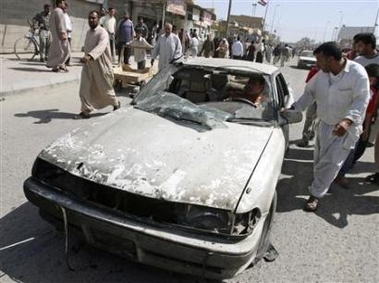Truck bomb kills 15 in Iraq
(AP)Updated: 2007-05-09 15:34
BAGHDAD - A suicide truck bomb blamed on al-Qaida linked insurgents exploded Wednesday outside the Interior Ministry in the Kurdish city of Irbil, killing at least 15 people and wounding 65, security and hospital officials said.
 A man drives his damaged car away from the scene of a suicide bomb attack in Kufa, 160 km (100 miles) south of Baghdad, May 8, 2007. [Reuters]  |
Windows were blown out down the street and wreckage was scattered nearly 100 yards away.
The blast also damaged the nearby security headquarters. Hamza Ahmed, a spokesman for the Irbil governor's office, said the dead and wounded included police and civilians.
Irbil, 215 miles north of Baghdad, is the capital of the Iraq's autonomous Kurdistan region, which has been relatively calm, despite the violence wracking much of the rest of Iraq.
Kurdish lawmaker Mahmoud Othman blamed the attack on Ansar al-Sunnah, a Sunni Arab insurgent group, and Ansar al-Islam, a mostly Kurdish militant group with ties to al-Qaida in Iraq. Ansar al-Islam has been blamed for a number of attacks, including attempts to assassinate Kurdish officials.
Othman said authorities learned that insurgents were planning a large attack a week ago when police arrested a militant cell in the town of Sulamaniya.
"During questioning they confessed that were getting training lessons in a neighboring country and that was Iran," he said.
The last major attack in Irbil took place Feb. 1, 2004, when twin suicide bombers killed 109 people in two Kurdish party offices. Ansar al-Sunnah claimed responsibility for that attack.
The Interior Ministry is next to the parliament for the Kurdish autonomous region of northern Iraq.
"Kurdistan is a safe region and this will have its affect on trade, and companies will fear coming to this region," Othman said.
|
||
|
||
|
|